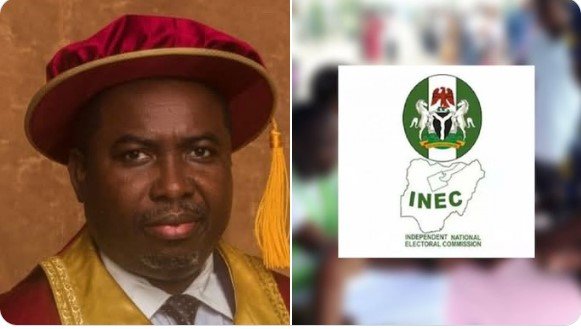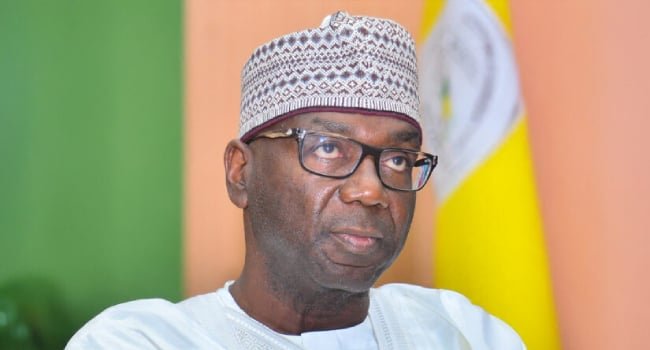Abuja — Professor Joash Ojo Amupitan, SAN, Chairman of the Independent National Electoral Commission (INEC), has made a bold declaration: decades-long problems of identity theft and multiple voting in Nigerian elections have been effectively eliminated thanks to the deployment of the Bimodal Voter Accreditation System (BVAS).
At a recent Commission event, Prof. Amupitan hailed BVAS as a “game-changer” in Nigeria’s electoral architecture, stating that the system’s biometric features have finally secured the accreditation process. With its twin authentication through fingerprints and facial recognition, BVAS ensures that only eligible voters can cast ballots — making it nearly impossible for someone to vote multiple times or impersonate another voter.
What the INEC Chairman Said
Prof. Amupitan emphasised that the deployment of BVAS is central to INEC’s technology-driven strategy to restore public confidence in elections. In his address, he noted that this biometric tool not only strengthens voter authentication but also supports transparent and secure transmission of results via INEC’s portal.
He argued that, with BVAS fully operational, the Commission is now able to verify a voter’s identity in real time, effectively closing loopholes that in past elections allowed electoral fraud through the use of someone else’s Permanent Voter Card (PVC) or duplicate votes.
This declaration comes amid INEC’s broader commitment to reform the electoral process, combining logistics overhaul, rigorous training, and stronger use of technology to deliver more credible and inclusive elections.
How BVAS Works: The Technical Backbone
The Bimodal Voter Accreditation System is designed with multiple layers of security:
- Biometric Authentication: BVAS requires both fingerprint verification and facial recognition for each voter. This dual check makes it highly unlikely that any voter can impersonate another or use a PVC that is not theirs.
- Real-Time Accreditation: Once a voter is accredited, the BVAS device records the accreditation data instantly, reducing opportunities for fraud before or during voting.
- Result Upload Capability: Beyond accreditation, BVAS devices can scan polling unit results and upload them through INEC’s result-viewing portal. This provides transparency and reduces the reliance on manual, paper-based result transmission.
INEC’s own 2023 election report confirms that BVAS was adopted precisely to eliminate the risk of multiple voting and PVC misuse through biometric verification.
Why the Announcement Matters
This is not just a technical brag. Prof. Amupitan’s statement is politically and socially significant:
- Increased Electoral Trust: By asserting that identity theft and multiple voting have been eliminated, INEC underlines its readiness to run elections that are more credible, fair, and transparent.
- Political Accountability: With robust accreditation and result-upload mechanisms, political actors face higher risks if they attempt to manipulate outcomes.
- Voter Confidence: Ordinary Nigerians — especially those disillusioned by past electoral fraud — may feel more confident in showing up to vote, knowing the system is more secure.
- Institutional Reform: The statement signals that INEC, under Amupitan’s leadership, is serious about reforming its operations and applying technology meaningfully, rather than paying lip service.
Challenges and Skepticism Persist
Despite the optimism, some observers remain cautious. BVAS has faced criticism and operational issues in past elections. Independent monitors have documented cases where accreditation via BVAS failed due to technical glitches, network problems, or poor biometric data capture.
Civil society groups and election watchdogs have also warned that technology alone cannot solve all problems. They argue that even with robust devices, the integrity of an election depends on well-trained personnel, strong internal controls, and political will to prosecute fraud when it occurs.
Moreover, some stakeholders highlight that declaring identity theft and multiple voting “eliminated” is a high-stakes claim. Any serious incident in future elections could erode public trust, especially if the system is portrayed as infallible.
What Comes Next
To validate his claim, Prof. Amupitan and INEC will need to deliver consistent, glitch-free deployments of BVAS across all elections. Key indicators to watch include:
- Performance in Off-Cycle Elections: How well BVAS performs during smaller polls (e.g., gubernatorial or local elections) will be a key test.
- Stakeholder Reports: Observers, civil society organisations, and media will closely track accreditation success rates, system downtimes, and user errors.
- Result Transparency: The efficiency and reliability of result uploads via BVAS will be monitored, especially whether data is posted quickly and accurately.
- Post-Election Audits: Independent audits and technical reviews will be vital in verifying INEC’s claim that identity theft and multiple voting have been “eliminated.”
- Public Dissemination: INEC’s communication strategy will be important: how the Commission explains to voters, parties, and the media what BVAS does — and its limitations.
Conclusion
INEC Chairman Prof. Joash Ojo Amupitan’s declaration that identity theft and multiple voting have been eliminated through BVAS is a bold and potentially transformative statement for Nigeria’s democracy. If borne out in practice, it could mark a turning point in restoring public faith in the electoral process.
But the real test lies ahead. For the claim to hold water, INEC must demonstrate consistent performance, transparency, and a willingness to engage with skeptics. The success of BVAS implementation — and not just the promise — will determine whether this moment becomes a lasting milestone in Nigeria’s electoral reform journey.
This report is based on statements made by INEC Chairman Prof. Joash Ojo Amupitan, SAN, in a public address and INEC’s publicly available election reports.














